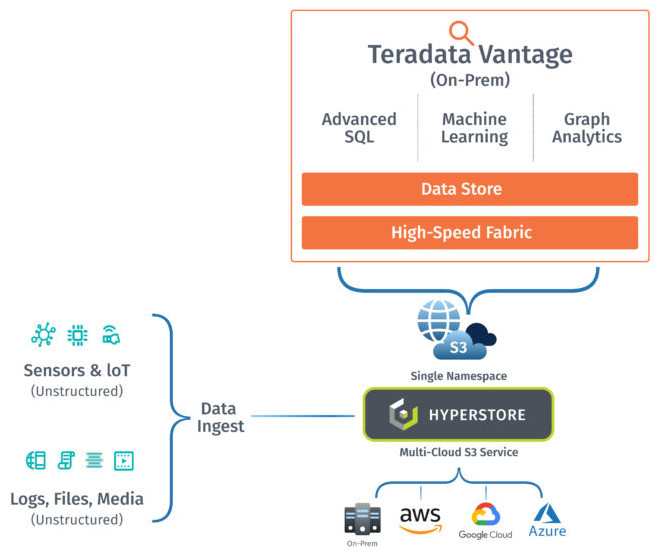Integration of Cloudian HyperStore Object Storage with Teradata Vantage on-Premises Deployment Option
Provides scalable, secure and cost-effective data lakehouse for data analytics.
This is a Press Release edited by StorageNewsletter.com on November 7, 2022 at 2:02 pmCloudian, Inc. announced integration of its HyperStore object storage with Teradata Vantage’s on-premises deployment option.
The combination of Teradata Vantage – the IntelliFlex and VMware editions – and HyperStore provides a public cloud-like data lakehouse solution for supporting analytics workloads in on-premises and hybrid cloud environments. Teradata customers can take advantage of HyperStore’s native S3 compatibility, exabyte-level scalability and military-grade security to analyze large volumes of data more easily and cost effectively.
Traditional storage solutions don’t always meet the scalability, cost and other requirements of modern analytics applications. In contrast, S3-compatible object storage has enabled organizations to build modern data lakehouses, where they can decouple storage from compute, run diverse analytic queries and data protection workloads, and provide secure multi-tenant access to data services employing standard S3 API calls. Moreover, because these data lakehouses are S3-compatible, customers can run analytics applications on their local data in place without having to use a public cloud.
Benefits of the company’s on-prem private cloud include enhanced performance, control over security, data sovereignty and reduced cost. Common use cases for Teradata customers could include data exploration, searchable archives, data sharing and more.
Cloudian is a provider named a Gartner Peer Insights Customers’ Choice for Distributed File Systems and Object Storage (1) for 3 consecutive years (2), and its HyperStore platform offers a range of benefits for a modern data repository, including:
-
Modular, limitless scalability – Start with 3 low-cost nodes and expand simply by adding devices to the cluster without disrupting analytics workloads.
-
Hybrid-cloud readiness – Employ policy-based tools to replicate or tier data to AWS, Google Cloud Platform, Microsoft Azure, or to another HyperStore cluster for offsite DR, capacity expansion or data analysis in the cloud.
-
Data resiliency – Get up to 14 nines of resiliency with administrator-defined data replication or erasure coding.
-
Ransomware protection – Through S3 Object Lock, prevent malware from encrypting and/or deleting data enabling recovery without paying ransom – and meet governance and legal hold demands.
-
Military-grade security – Further secure data with features such as secure shell, integrated firewall, RBAC/IAM access controls, AES-256 server-side encryption for data at rest and SSL for data in transit, as well as certification with the stringent government security requirements.
-
Multi-tenancy – Allow multiple users to store and analyze data within a single, shared data lakehouse – without compromising security – while also employing multi-tenant billing, metering and QoS controls.
“With so much data available, enterprises have previously faced the ongoing and growing challenge of figuring out what data is important – and should be kept – and what isn’t important,” said Lisa Stewart, SVP global partner and alliances, Teradata. “Today, there are solutions that make it economically sound to collect and save data that was often discarded in the past but can contain valuable insight. Cloudian’s integration with Teradata provides one such solution – a data lakehouse built on a highly scalable and secure storage foundation that enterprises can use to derive more value from more data with the powerful analytics capabilities of Teradata Vantage on-premises offerings.”
“With an S3-compatible data lakehouse enabled by Teradata and Cloudian, organizations can run the same analytics applications on local data as they do on cloud-based data while also protecting that data by housing the backups,” said Larry Meese, VP products and solutions, Cloudian. “This makes it much easier and more cost-effective to gain new insights from their digital assets and drive greater business and operational success.”
(1) Gartner defines distributed file systems and object storage as software and hardware solutions that are based on ‘shared nothing architecture’ and that support object and/or scale-out file technology to address requirements for unstructured data growth.
(2) Gartner, Gartner Peer Insights ‘Voice of the Customer’: Distributed File Systems and Object Storage, Peer Contributors, February. 6, 2020. Gartner, Gartner Peer Insights ‘Voice of the Customer’: Distributed File Systems and Object Storage, Peer Contributors, March 11, 2021. Gartner, Gartner Peer Insights ‘Voice of the Customer’: Distributed File Systems and Object Storage, Peer Contributors, April 22, 2022.















 Subscribe to our free daily newsletter
Subscribe to our free daily newsletter

